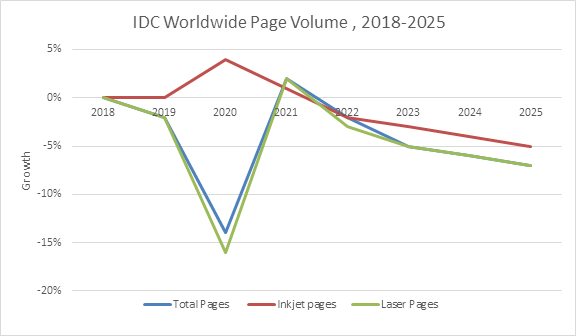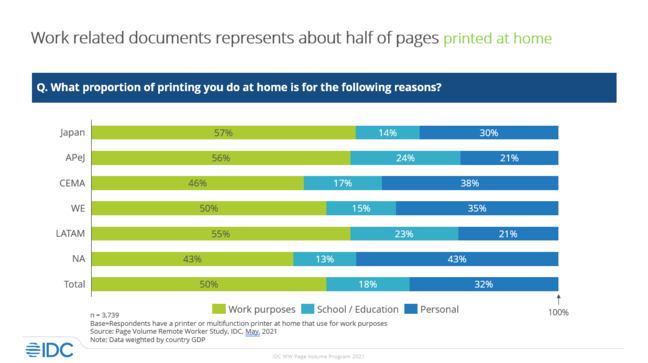Paperless Office? 2.8 Trillion Pages Printed In 2020, Down By 14% Or 450 Billion Sheets

Around 450 billion fewer pages were printed from home and office devices in 2020 as COVID-19 disrupted the world of work.
The direction of travel has been obvious in recent times: people were printing less even before the pandemic took hold, but the decline was sharper last year as volumes plunged 14 per cent on 2019 levels to a total of 2.8 trillion pages, according to IDC.
Unsurprisingly, employees being asked to stay indoors and work from home caused the number of laser pages printed to fall 16 per cent, a drop that was even more pronounced for A3 devices.
Conversely, pages printed on inkjet printers went up by 4 per cent compared to the prior 12 months. Inkjets were typically used mostly for personal printing before COVID-19 turned the world upside down.
According to IDC's 2021 end-user survey of 4,700 people, about 50 per cent of the pages printed at home were work-related documents. In Western Europe, for example, some 15 per cent of pages were printed for school/ education needs and the rest for personal stuff.
These dynamics could be seen in the financial results of the biggest print vendor: HP's commercial print hardware revenue shrank 22 per cent to $923m for its entire fiscal 2020 ended October. Its consumer print hardware grew 21 per cent to $772m and its supplies business was down 1 per cent to $3.159bn.
IDC forecasts a 2 per cent rebound in page volumes for 2021 and a return to the declining trend from next year, falling faster than pre-COVID days as many employees mix up working from home with commuting to the office or other sites.
According to Gartner, 47 per cent of knowledge workers will work remotely next year, up from 19 per cent in 2019.
Illona Stankeova, IDC Europe senior research director for Imaging Devices & Document Solutions, said: "Pages printed at home will not offset declines in offices as organisations and governments continue to pursue paperless initiatives and digital transformation agendas."
- For a true display of wealth, dab printer ink behind your ears instead of Chanel No. 5
- You'll want to shut down the Windows Print Spooler service (yes, again): Another privilege escalation bug found
- Holy margins, Batman: Pandemic tech prices balloon as demand outweighs stocks and suppliers get greedy
- HP bows to pressure, reinstates free monthly ink plan... for existing customers
- Ink tanks park themselves all over the lawns of Western Europe as orders flood in
She estimates that people of the world will print 2.3 trillion pages in 2025. "Despite this decline this amount still represents about 4.4 million pages being printed globally every minute covering the area of 39 footballs fields every minute."
A typical 500-sheet packet of paper was estimated by the Sierra Club to weigh five pounds, equating to roughly 10,000 to 20,000 sheets per tree. ®
From Chip War To Cloud War: The Next Frontier In Global Tech Competition
The global chip war, characterized by intense competition among nations and corporations for supremacy in semiconductor ... Read more
The High Stakes Of Tech Regulation: Security Risks And Market Dynamics
The influence of tech giants in the global economy continues to grow, raising crucial questions about how to balance sec... Read more
The Tyranny Of Instagram Interiors: Why It's Time To Break Free From Algorithm-Driven Aesthetics
Instagram has become a dominant force in shaping interior design trends, offering a seemingly endless stream of inspirat... Read more
The Data Crunch In AI: Strategies For Sustainability
Exploring solutions to the imminent exhaustion of internet data for AI training.As the artificial intelligence (AI) indu... Read more
Google Abandons Four-Year Effort To Remove Cookies From Chrome Browser
After four years of dedicated effort, Google has decided to abandon its plan to remove third-party cookies from its Chro... Read more
LinkedIn Embraces AI And Gamification To Drive User Engagement And Revenue
In an effort to tackle slowing revenue growth and enhance user engagement, LinkedIn is turning to artificial intelligenc... Read more



